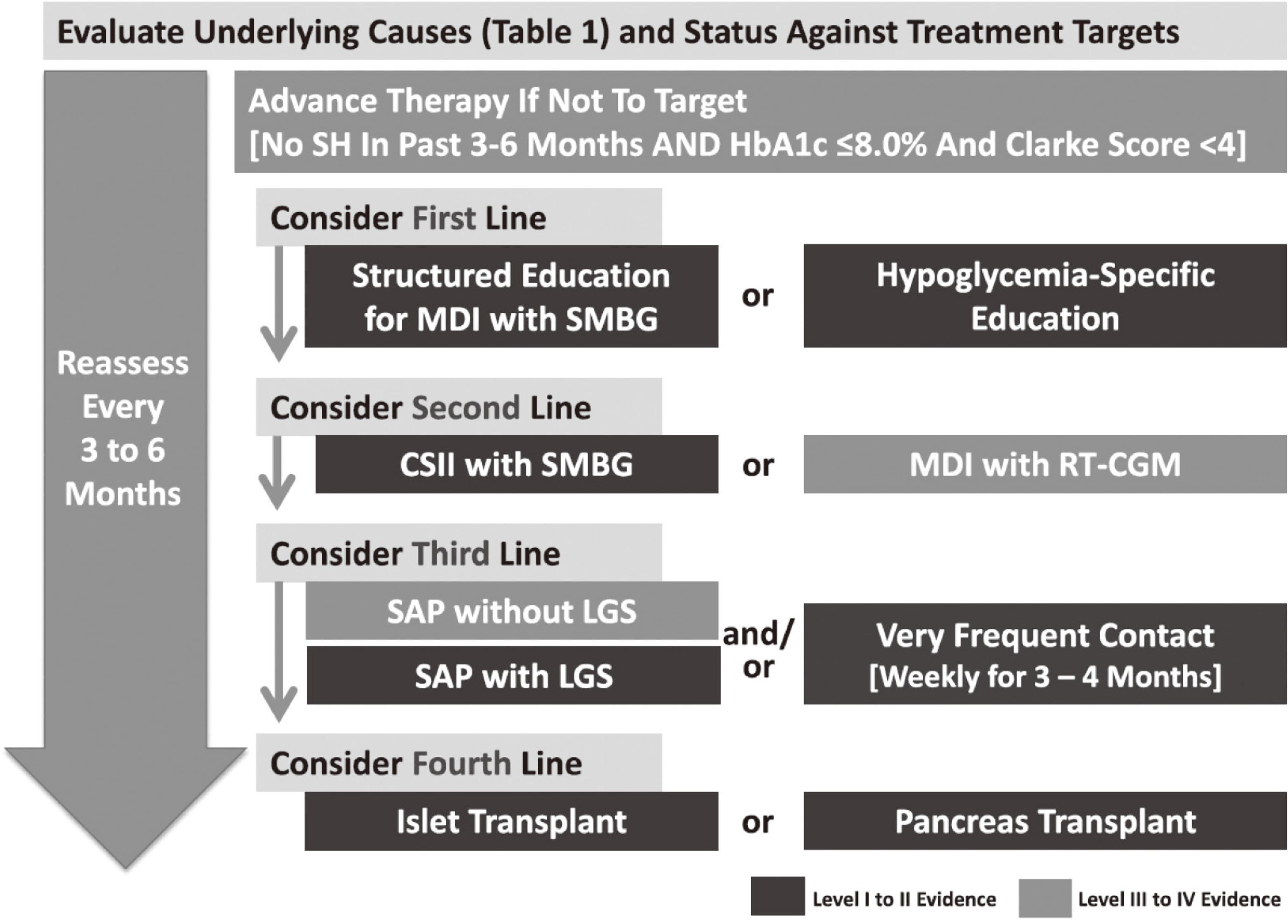J Korean Diabetes.
2016 Mar;17(1):6-10. 10.4093/jkd.2016.17.1.6.
Management of Hypoglycemic Unawareness and the Current Status of Clinical Allogeneic Islet Transplantation
- Affiliations
-
- 1Division of Endocrinology and Metabolism, Department of Medicine, Samsung Medical Center, Sungkyunkwan University School of Medicine, Seoul, Korea. sjin772@gmail.com
- KMID: 2161124
- DOI: http://doi.org/10.4093/jkd.2016.17.1.6
Abstract
- Problematic hypoglycemia is defined as a condition in which episodes of severe hypoglycemia are unpredictable and/or cannot be easily explained or prevented, typically associated with impaired awareness of hypoglycemia. The treatment algorithm for patients with type 1 diabetes and problematic hypoglycemia emphasizes the stepwise approach including structured education regarding multiple daily injections of insulin, use of technology such as sensor-augmented pump with low glucose suspension, and islet or pancreas transplantation. Although the prevalence of insulin independence at 5 years is 25~50% in most recent clinical trials of islet transplantation, both islet and pancreas transplantation are equally efficient to cure severe hypoglycemia for more than 5 years in about 70% of the recipients. To date, international cohorts of clinical islet transplantation such as the French-Swiss GRAGIL Network have successfully reproduced the long-term C-peptide positivity initially achieved with the Edmonton protocol, with long-term insulin independence demonstrated in selected cases. Several cases with partial islet graft function have been reported in Korea, with the first case of long-term insulin independence being reported in late 2015. Therefore, islet transplantation can offer freedom from life-threatening severe hypoglycemia for type 1 diabetes patients with problematic hypoglycemia, even in non-responders to the latest technology-based treatment.
Keyword
MeSH Terms
Figure
Reference
-
References
1. Shapiro AM, Lakey JR, Ryan EA, Korbutt GS, Toth E, Warnock GL, Kneteman NM, Rajotte RV. Islet transplantation in seven patients with type 1 diabetes mellitus using a glucocorticoid-free immunosuppressive regimen. N Engl J Med. 2000; 343:230–8.
Article2. Choudhary P, Rickels MR, Senior PA, Vantyghem MC, Maffi P, Kay TW, Keymeulen B, Inagaki N, Saudek F, Lehmann R, Hering BJ. Evidence-informed clinical practice recommendations for treatment of type 1 diabetes complicated by problematic hypoglycemia. Diabetes Care. 2015; 38:1016–29.
Article3. Gold AE, MacLeod KM, Frier BM. Frequency of severe hypoglycemia in patients with type I diabetes with impaired awareness of hypoglycemia. Diabetes Care. 1994; 17:697–703.
Article4. Geddes J, Schopman JE, Zammitt NN, Frier BM. Prevalence of impaired awareness of hypoglycaemia in adults with type 1 diabetes. Diabet Med. 2008; 25:501–4.
Article5. Skrivarhaug T, Bangstad HJ, Stene LC, Sandvik L, Hanssen KF, Joner G. Long-term mortality in a nationwide cohort of childhood-onset type 1 diabetic patients in Norway. Diabetologia. 2006; 49:298–305.
Article6. Dunn TB, Kirchner V, Bellin MD. Beta-cell replacement therapy: current outcomes and future landscape. Curr Opin Organ Transplant. 2015; 20:681–90.7. Hering BJ, Bellin MD. Transplantation: sustained benefits of islet transplants for T1DM. Nat Rev Endocrinol. 2015; 11:572–4.8. Lablanche S, Borot S, Wojtusciszyn A, Bayle F, Tétaz R, Badet L, Thivolet C, Morelon E, Frimat L, Penfornis A, Kessler L, Brault C, Colin C, Tauveron I, Bosco D, Berney T, Benhamou PY. GRAGIL Network. Five-year metabolic, functional, and safety results of patients with type 1 diabetes transplanted with allogenic islets within the Swiss-French GRAGIL network. Diabetes Care. 2015; 38:1714–22.
Article9. Bellin MD, Barton FB, Heitman A, Harmon JV, Kandaswamy R, Balamurugan AN, Sutherland DE, Alejandro R, Hering BJ. Potent induction immunotherapy promotes longterm insulin independence after islet transplantation in type 1 diabetes. Am J Transplant. 2012; 12:1576–83.
Article10. Yang TY, Oh SH, Jeong IK, Seo IA, Oh EY, Kim SJ, Chung JH, Min YK, Lee MS, Lee MK, Kim KW, Do YS, Choo SW. First human trial of pancreatic islet allotransplantation in Korea: focus on retransplantation. Diabetes Res Clin Pract. 2002; 56:107–13.11. Jin SM, Oh SH, Kim SK, Jung HS, Choi SH, Jang KT, Lee KT, Kim JH, Lee MS, Lee MK, Kim KW. Diabetes-free survival in patients who underwent islet autotransplantation after 50% to 60% distal partial pancreatectomy for benign pancreatic tumors. Transplantation. 2013; 95:1396–403.
Article12. Yang HK, Ham DS, Park HS, Rhee M, You YH, Kim MJ, Kim JW, Lee SH, Hong TH, Choi BG, Cho JH, Yoon KH. Reversal of hypoglycemia unawareness with a single-donor, marginal dose allogeneic islet transplantation in Korea: a case report. J Korean Med Sci. 2015; 30:991–4.
Article
- Full Text Links
- Actions
-
Cited
- CITED
-
- Close
- Share
- Similar articles
-
- History, current status and perspective of islet transplantation
- Islet Transplantation vs. Pancreas Transplantation
- Clinical Allogeneic and Autologous Islet Cell Transplantation: Update
- Reversal of Hypoglycemia Unawareness with a Single-donor, Marginal Dose Allogeneic Islet Transplantation in Korea: A Case Report
- Pancreas Islet Cell Transplantation: Present and Future


